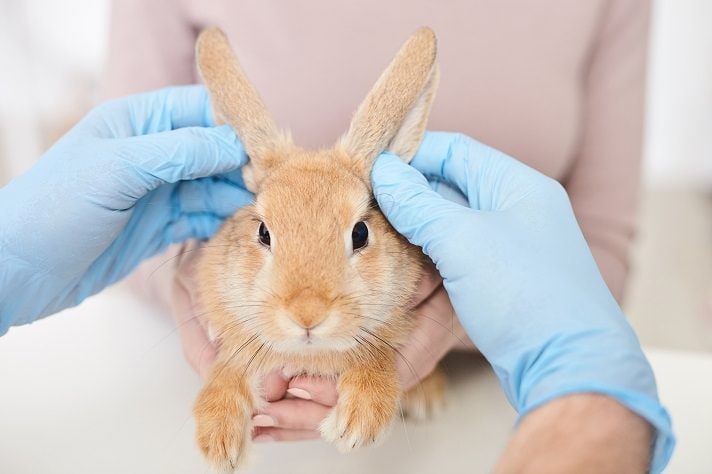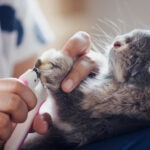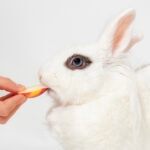Is Your Rabbit Sick?

Photo by Close up of hands of skillful veterinarian examining the rabbit. He is touching its ears
It’s been a long day. You come home from work and immediately start to fix dinner. Your daughter comes to you after checking in on the family rabbit, Hippity. “Mom, I think something is wrong with Hippity,” she says. “What do we do?”
What do you do? Just like yourself, your pet rabbit may encounter some health issues along the road of life. Knowing when your rabbit is having a health issue and what to do about it will make caring for your beloved pet a lot less stressful. First of all, how do you know if your rabbit is sick?
“Decreased activity, lethargy and decreased appetite,” said Angela M. Lennox, DVM, DABVP-Avian, of the Avian and Exotic Animal Clinic of Indianapolis in Indiana.
“These signs are not specific for any single illness,” she added, “and can be caused by a variety of problems.”
Lennox noted that as prey species, rabbits hide signs of illness and that it is common for those with chronic or long-term illnesses to suddenly appear sick.
Byron de la Navarre, DVM, of the Animal House of Chicago in Illinois, explained that any change in appearance could indicate a health issue.
“Normal bunnies are very meticulous, just like cats,” he said. “They don’t require a lot of grooming. If you start to notice an unkempt fur coat or hair mats that they normally don’t have or that urine or fecal material is staining where they go to the bathroom or their feet or tail, those would be indications that something might not be well with the bunny.
“If you do notice something,” he continued, “hopefully you have already established a relationship with a veterinarian who is familiar with treating rabbits. Some change from the normal should prompt a call. We take lots of calls all the time during the day just to put people at ease. Or, if it’s a real issue, to schedule an appointment right away or come in right away, depending on how severe it sounds.”
Sometimes health issues arise at night after the veterinarian’s office has closed for the day. Don’t panic, there may be an emergency veterinary office that is open through the night. Do some research ahead of time to know where the closest one to you is located. Typically your veterinarian’s office recommends one in its after-hours recording. Thinking of waiting until Monday? Sometimes it is best not to wait.
“We’ve had some people who’ve noticed something on Saturday afternoon or Saturday evening and thought they could wait until Monday morning,” de la Navarre said. “Maybe the animal luckily is still with us, but it’s a lot sicker than perhaps if it had been treated right away.”
Common Signs Your Rabbit Is Sick
To help know if your rabbit is ill, check out the following list of symptoms.
1. Increase Or Decrease In Appetite Or Drinking
“Appetite in all animals is a big thing,” de la Navarre said. “It can be overeating, but especially if they’re not eating as much and especially if they’re not eating their favorite food. That should cause a red flag to go up.”
According to Leticia Materi, PhD, DVM, of the Calgary Avian & Exotic Pet Clinic of Alberta, Canada, lack of appetite and/or stool is probably the No. 1 reason her clinic sees sick rabbits.
“When a rabbit stops eating,” she said, “the gastrointestinal tract will slow down and even stop moving, thus leading to reduced output of droppings. This is known as gastrointestinal stasis. It may be a primary gastrointestinal issue such as a poor diet — lack of fiber, too much carbohydrate, ingesting foreign material such as carpet fibers, excess fur or drywall, or dental disease. Alternatively, a reduced appetite could be a secondary gastrointestinal problem such as pain (i.e., arthritis, bladder stone), kidney or liver disease, cancer, or heart disease. A rabbit that is alert and active but not eating well should be seen by a veterinarian within 24 hours.”
Decreased or in particular increased drinking of water is also an indication of a possible health problem. According to de la Navarre, increased drinking in many animals could be an indication of something going on, whether it’s involving the kidneys, urinary tract or other systems.
Treatment: Take the rabbit to a veterinarian experienced with rabbits. Physical exam, fluids, syringe-feeding, medications, radiographs and surgery (if there is blockage in the digestive tract or intestines) are all possible treatments your veterinarian may advise.
2. Anorexia, Lethargy, Enlarged, Painful Gas-Filled Abdomen, Teeth Grinding
Rabbit gastrointestinal stasis, known as RGIS for short, is a common disorder, according to Lennox.
“Rabbits usually present with varying degrees of anorexia and lethargy,” she noted. “Severely affected rabbits may have an enlarged, painful gas-filled abdomen and may show a painful, hunched posture with teeth grinding. Depending on the cause or severity, disease can be mild or life threatening.”
Providing your rabbit with a good diet of grass hay and green foods can help prevent RGIS.
Treatment: Take your rabbit immediately to your veterinarian for treatment. According to Jennifer Blair, DVM of St. Francis Animal & Bird Hospital in Roseville, Minnesota, “The treatment of GI stasis is based on the cause and severity of disease. Your veterinarian may prescribe fluid therapy, medications to improve your rabbit’s GI motility, pain medications, and assisted feeding.”
3. Drooling, Slobbers, Hair Loss On The Chin And Neck, Loss Of Appetite
These are all common signs of dental disease in rabbits, Blair said. “Dental disease can be the result of a variety of factors including trauma, genetics, nutritional disease, infectious disease and diet. Any condition that causes a rabbit’s teeth to be worn down improperly or causes poor alignment can result in dental disease. The best prevention for dental disease is a healthy diet of grass hay and green foods.”
Treatment: Take your rabbit to a veterinarian experienced with rabbits. Physical exam using anesthesia may be necessary to evaluate the rabbit’s teeth. Treatment is dependent on the cause and severity of the disease, according to Blair. “A rabbit should have a dental examination performed by a veterinarian at least once a year,” she advised. “Regular tooth trims under anesthesia may be necessary.”
4. Discharge From Nose, Sneezing Or Coughing, Difficulty Breathing
“Since rabbits are obligate nasal breathers — can only breathe through their nose,” Materi said, “disease of the upper respiratory tract is much more serious in this species than in many others. Signs of respiratory disease include nasal discharge, flared nostrils when breathing, increased respiratory effort, stretched necks and open mouth breathing.”
Materi added that open-mouth breathing is a very bad sign. Difficulty breathing can be due to a primary respiratory issue, such as pneumonia, or a secondary respiratory disease, such as cardiac failure.
Treatment: Take to the veterinarian immediately. Your veterinarian may treat your rabbit with antibiotics, medications to expand airways, oxygen therapy, radiographs to evaluate the lung fields and heart, plus mild anti-anxiety medication to relieve stress.
“Certain bacteria can be contagious, so monitoring other rabbits at home is a good idea,” Materi recommended. “Cardiac disease can be managed through proper medication, but the long-term prognosis may be poor if the disease is very advanced.”
5. Change In Stools (Diarrhea, Decreased Stools)
“The appearance of your rabbit’s poop is a barometer of health, so monitor him closely,” advised Jennifer Graham, DVM, DABVP-Avian/Exotic Companion Mammal, DACZM, assistant professor of Zoological Companion Animal Medicine at the Department of Clinical Sciences in the Tufts Cummings School of Veterinary Medicine, Massachusetts. “Healthy rabbits on an appropriate diet — primarily grass hay, fresh vegetables, and minimal timothy-based pellets with no seeds/treats — should have large, well-formed fecal pellets. Poops that are decreased in size or loose are not normal.”
Graham shared how she recently saw a rabbit that had been treated for loose stools for a couple of weeks with various medications. “By the time we diagnosed,” she said, “he had toxic levels of lead. He was so sick we were unable to help the rabbit.”
Graham believes that being proactive about loose stools is in the best interests of your pet.
“It is possible that loose stools could be caused by a contagious condition if there is an underlying parasitic or bacterial disease,” she said. “So if signs persist, separate the affected rabbit from other animals and have him examined by a veterinarian to determine the cause of the signs.”
Treatment: If your rabbit has loose stools, Graham said you can temporarily cut out pellets and feed your pet a primarily hay diet.
“If the stools do not improve quickly — within two to three days of diet change,” she said, “make sure to have your rabbit examined since we can see stool changes with dental disease, toxin exposure — especially ingestion of lead-based paint, parasites and other diseases.”
Worried about cutting out the pellets? Discuss with your rabbit veterinarian.
“I sometimes cut them out altogether if a rabbit is overweight,” Graham said.
6. Change In Urine, Such As Blood, Color Change Or Cloudiness
“The normal color of rabbit urine can range from yellow to dark orange-red and can change based upon what your rabbit is eating,” Blair said. “The color comes from plant pigments in the food or from normal pigments produced in the wall of the bladder. The urine can be clear or cloudy with a white precipitate — excess calcium. Rabbits can develop disease of the bladder or kidneys and may exhibit signs such as blood in the urine, straining to urinate, inappropriate or frequent urination, or the complete inability to urinate. The best prevention for urinary disease is adequate water intake and an appropriate diet.”
Graham recommended that rabbit owners monitor the appearance of urine in their pets, because it can help the owner pick up on an underlying disease process.
“Does your rabbit have blood in the urine?” she asked. “If so, get it to the vet right away. Blood in the urine, also known as hematuria, can be a sign of a urinary tract infection, stones in the urinary tract or cancer. Make sure your female rabbit is spayed. If your female rabbit is not spayed, she will have a very high risk of developing uterine/reproductive cancer and this can manifest by passing blood in the urine.
“Rabbits excrete excess calcium from the diet in the urine, so a chalky appearance to the urine can indicate your rabbit’s diet is too high in calcium,” Graham continued.
She recommended that all rabbits be on timothy-based pellets and grass hay after 1 year of age.
“Diets that are too high in calcium,” she said, “can increase the risk of your rabbit developing stones in the urinary tract, which can develop into a life-threatening condition, such as a urinary tract obstruction. Occasional white crystalline material in the urine can be normal, but if you are seeing more chalky-type urine on a consistent basis, it is worth a veterinary visit.”
In regard to a change in color in your rabbit’s urine, Graham said that rabbits can pass porphyrins (pigments) in their urine.
“The appearance of these may change depending on the diet. Porphyrinuria can result in rust or brown-colored urine, which can be concerning to owners if they have never seen this before.”
Treatment: Take your rabbit to the veterinarian immediately, especially if you see blood in your rabbit’s urine.
“If you have concerns,” Graham said, “have your veterinarian check your rabbit’s urine for blood to distinguish between blood in the urine — bad — and harmless pigment in the urine — normal. Even if a urinary tract infection is present, this is not likely to be contagious to other animals, but it may be easier to initially separate your rabbit from other animals so you can monitor urine output/color/frequency for the individual pet.”
7. Rabbit’s Head Tilts To One Side, Poor Coordination, Problem With Eye On The Down Side Of Tilt
This is called “head tilt” and can appear quite suddenly.
“Head tilt is often due to dysfunction of the vestibular system — the system of the body that controls balance,” Materi said. “The vestibular system has two components: a central component found in the brain and a peripheral component found in the inner ear. In addition to a head tilt, rabbits with vestibular disease may also show poor coordination when walking, rolling or circling and nystagmus — darting of the eyes side-to-side or up-and-down. There is often secondary eye trauma as the down eye is often pushed into the ground or traumatized when the rabbit rolls. This condition may be the result of infection by bacteria such as Streptococcus, Bordetella, Pseudomonas and Pasteurella or parasites such as Encephalitozoon cuniculi and Baylisascaris.”
Treatment: Take your rabbit to your veterinarian immediately. Your veterinarian will examine your rabbit and may order blood work, radiographs of the skull and an MRI.
“Depending on the cause and the severity of damage,” Materi said, “the prognosis for these rabbits can vary. I have seen some rabbits make a full recovery, some have retained symptoms, but are able to function normally, while some never recover and gradually worsen leading to a poor quality of life.”
8. Hair Loss, Itchy, Scaly, Flaky Coat Or Skin
According to Blair, rabbits can develop a variety of skin conditions, such as mites, lice, fungal infections (ringworm), bacterial infections and allergies.
“Some rabbits shed their hair coat, molt, by losing big clumps of fur,” she said. “This is considered normal, but can be alarming to a new rabbit owner. Some of these issues — mites, ringworm — can be contagious to other rabbits in the household.”
Graham said that while very small flakes can be seen on rabbit skin on occasion, excessive flakiness is not normal.
“If you part your rabbit’s fur and see a lot of dandruff or white flakes,” she said, “this can be a sign of infection. In particular, Cheyletiella parasitovorax is a parasite that is also termed ‘the walking dandruff mite.’ This mite is contagious to humans and other animals, so it is best to have a veterinarian treat this condition.”
Treatment: Consult with your rabbit veterinarian within 48 hours. Your veterinarian may do a physical exam plus skin scrapings.
9. Biting, Growling, Attacking
“If your rabbit is young and is not yet spayed or neutered,” Graham said, “increased biting, growling, or even ‘attacks’ can be common as rabbits reach sexual maturity.”
Graham stressed that all female rabbits should be spayed, preferably around 6 months of age.
“If your rabbit is already spayed or neutered,” she added, “make sure the other rabbits in the household are as well, because we can see these behaviors in a rabbit that is already spayed or neutered when in the presence of unaltered rabbits. If your rabbit is older and already spayed/neutered, it is worth having your rabbit examined. I have seen endocrine disease, usually adrenal-related, result in these behaviors in rabbits. Keep in mind that biting behavior can be seen in animals in pain. I have seen rabbits resist handling and be more ‘nippy’ with painful medical conditions such as arthritis. Pain control can be helpful to improve the quality of life for the rabbit and often results in the abnormal behaviors improving.”
Treatment: Consult with your rabbit veterinarian.
10. Wounds On Bottom Of Feet
Wounds on the bottom of your rabbit’s feet are referred to as hock sores or ulcerative pododermatitis.
Hock sores, Materi said, “are often seen in Rex rabbits due to the sparse fur on the bottom of their feet, overweight or large breed rabbits, rabbits housed on dirty bedding or hard surfaces, and rabbits that have limited mobility either due to small cage size or medical conditions such as arthritis or spondylosis. These sores can quickly spread to underlying bone and ligaments.”
Materi describes rabbits with hock sores as reluctant to move with ulcers or scabs on the bottom of their feet. Also, if you look in your rabbit’s cage, you may see spots of blood from the hocks.
Treatment: Materi said that treatment for hock sores consists of “controlling infection and pain as well as addressing housing inadequacies. Radiographs are necessary to evaluate the bones of the feet. The prognosis varies depending on the severity of the lesions.”
11. Lumps Or Masses
“Rabbits can develop skin masses,” Blair said, “abscesses or pockets of infection, often Pasteurella multocida.”
Materi recommended that lumps and bumps be seen in a timely manner.
“Abnormal lumps may be due to abscesses, cancer or cysts,” she said.
Treatment: Blair recommended taking your rabbit to a veterinarian for a fine-needle biopsy. Materi said that treatment may consist of medications or surgery.
“We have referred several rabbits with cutaneous cancer to oncology specialists for radiation therapy,” she said.
12. Paralysis
According to Materi, this is often due to trauma to the vertebral column. “Rabbits have very powerful hindquarters and a relatively fragile skeletal system,” she said, “and if they begin to flail uncontrollably, they can twist and kick hard enough that they can cause fractures to the bones of the spine. This can lead to spinal cord injury. As a result, these rabbits often have weakened or paralyzed hind legs and can even lose control of the bladder and anus, leading to incontinence.”
Treatment: Take the rabbit to a veterinarian. Your veterinarian will do a physical exam and radiographs.
“The prognosis depends on the severity of the injury and clinical signs,” Materi said. “These rabbits require lifelong dedication from their owners to ensure that they do not develop sores or urine scalding.”
Prevention Is Medicine
The best way to stop health issues is to prevent them from happening.
“Rabbits benefit from yearly examinations,” Lennox said, “with exams every six months for rabbits older than 4 years of age. The veterinarian will weigh your rabbit to watch for marked changes that might indicate illness. Owners can weigh their rabbits at home and contact the veterinarian if there are consistent or marked changes.”
You should also check out your rabbit regularly at home by handling and examining him.
Blair points out that “Discharge from the ears, head shaking, itching, hair loss, sneezing, discharge from the eyes or nose, drooling or moist dermatitis around the mouth or chin, weight loss, urine scald or fecal matting, breathing abnormalities, a distended abdomen, or a change in your rabbit’s gait/hopping are all clinical changes that may be easily noted at home. These clinical signs would warrant a visit to your rabbit veterinarian.”
By: Melissa Kauffman
Featured Image: YakobchukOlena/iStock/Thinkstock



